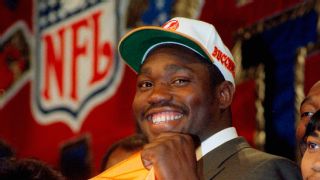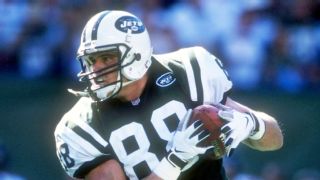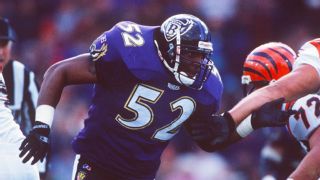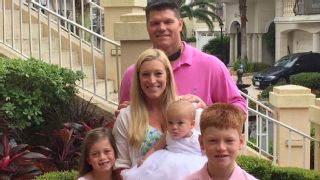|
New York Jets fans at the 1995 NFL draft: "We want Sapp! We want Sapp! We want Sapp!" Commissioner Paul Tagliabue: "The New York Jets select, tight end, from Penn State, Kyle Brady." Fans: Groans and boos. ESPN's Chris Berman on air: "Oooooh. Ladies and gentlemen, our first real upset, I think, at this point in the draft." It was one of those infamous moments in Jets history, right up there with Ken O'Brien over Dan Marino in the '83 draft, Marino's fake spike, Mark Gastineau's roughing-the-passer in Cleveland and, of course, Mark Sanchez's butt fumble. On April 22, 1995 -- making this a not-so-happy 20-year anniversary for the fans who lived it -- the Jets passed on a chance to draft University of Miami defensive tackle Warren Sapp, who went on to a Hall of Fame career with the Tampa Bay Buccaneers and Oakland Raiders. Concerned by positive drug tests in Sapp's dossier at the league office, which was made available to teams on the eve of the draft, the Jets decided to play it safe, opting for an All-American tight end with an All-America image. That one decision impacted three franchises, propelling two -- the Bucs and Baltimore Ravens -- to Super Bowl titles and one to the bottom of the NFL. The Jets went from bad to laughingstock during the worst two-year stretch in franchise history: a 4-28 record. It certainly wasn't Brady's fault, but, in retrospect, the first draft choice of the Rich Kotite regime was an ominous sign. Kotite, who fancied himself a "dese, dems and dose" guy from Brooklyn, turned the Jets into a 3-D mess. The fallout of the Sapp/Brady decision was felt for years. "What impacted the franchise was the decision to allow Rich Kotite make decisions," recalled Boomer Esiason, the quarterback in 1995. "Remember, he said it himself: 'I'm no genius.'" To be fair, 10 other teams passed on Sapp, including the Bucs. Instead of taking him with the seventh pick, they traded places with the Philadelphia Eagles and grabbed him at the 12th spot. Now that's genius. In retrospect, it worked out brilliantly for the Bucs and Sapp, but it was an excruciating wait. The hurt stayed with him for a long time. It was no picnic for Brady, either. He was the ninth pick and, even though he claimed the crowd's negative reaction didn't bother him, he felt the immediate weight of huge expectations. It nearly broke him.  Kotite unwittingly fueled Sapp Fever in New York with comments that appeared in Sports Illustrated the week before the draft. "I gotta have him," he told SI's Paul Zimmerman, who also mentioned in the article he bet Kotite a cigar that he wouldn't have the guts to take Sapp. There had been league-wide rumblings about Sapp's off-the-field issues. They intensified, shaking the walls inside the Jets' facility. The Jets, like every team, received access to confidential player files at the league office, supplementing intel they had gathered on their own. The day before the draft, the teams learned Sapp had tested positive six times for marijuana and once for cocaine in college, according to newspaper reports. Sapp was near the top of the Jets' draft board, according to former personnel director Pat Kirwan. They brought him into town for a visit nine days before the draft, sat him down with the team psychologist and seemed satisfied that he'd be fine. But once they heard about the drug reports, they affixed a red dot next to his name on the board, effectively removing him from consideration with the ninth and 16th picks. (The latter choice came from the Arizona Cardinals in exchange for wide receiver Rob Moore, another unpopular Kotite trade.) "It was not going to happen," Kirwan said of Sapp to the Jets. The Jets were starting a new era, and they didn't want to generate bad publicity by drafting a player -- albeit a potential star -- with a shadowy past. They also were targeting Brady, which made little sense because they already had a first-round tight end, Johnny Mitchell, chosen in 1992. But, hey, they made a lot of unusual moves in those days. After learning of the drug reports, Kirwan drove into Manhattan and met with Sapp and his agent, Drew Rosenhaus, in Sapp's room at the Marriott Marquis. Kirwan said he was up-front with Sapp, preparing him for the likelihood of a draft-day slide and informing him, "We're not going to be allowed to take you because of the drug tests."  Kirwan liked Sapp personally. He didn't want to see him humiliated on national television, so he suggested that he leave town to avoid the madness. Sapp wanted to stick it out; that impressed Kirwan. There were subsequent conversations between the Jets and Rosenhaus, who called the team's offices later that night in an attempt to ease their concerns. That's what agents do. "I thought there was a fighting chance they'd select him, based on our conversations," said Rosenhaus, who figured it was a "no-brainer" for the Jets. Sapp was widely regarded as a top-five talent, a rare defensive-tackle prospect because of his ability to rush the passer. By then, the Jets were locked on Brady, leading to some anxious moments during the run-up to the draft. They heard from a Penn State source that Brady worked out for a Cleveland Browns delegation a few days before the draft. The Browns, coached by Bill Belichick, followed up with a phone call to the school to get Brady's shoe and helmet size -- a sure sign of serious interest. The Browns owned the 10th pick, one spot behind the Jets, who felt confident they'd get their man as long as their interest didn't leak. In a humorous aside, Brady turned down the Jets' invitation to take a pre-draft visit, thinking it would be a wasted trip because there was no chance they'd pick him. The Jets weren't pleased, but it didn't change their infatuation. They saw Brady, a hulking 6-foot-6, 270 pounds with receiving skills, as a face-of-the-franchise player. "A Mark Bavaro kind of player and whistle-clean," Kirwan said. Along came draft day, and Sapp kept slipping, slipping, slipping. Suddenly, the Jets were on the clock, and the crowd at Radio City Music Hall was crazed. This, the fans figured, was the football gods doing them a solid after years of bad luck and bad drafting. "At that point, we felt like it was going to happen with Warren and the Jets," Rosenhaus said. "When they took Brady, it took the wind out of our sails. Brady went a little higher than people projected him. Obviously, the crowd was deflated." Brady was blindsided. He thought he was Cleveland-bound. "I admit, I was mystified as the fans were," he said. To this day, Rosenhaus still is chafed by the drug reports, insisting "they were completely unsubstantiated and exaggerated." At the time, the league released a statement, saying the cocaine allegation was false. Nevertheless, the news had a profound effect, turning Sapp into That Guy in the green room -- the poor, uh, sap trying to hold it together with a camera in his face. "There were 15 minutes between each pick, but each pick felt like hours," Rosenhaus said. "You want it to be an enjoyable process, but it turns excruciating. In hindsight, I don't know if he'd change anything, but on that particular day, it wasn't pleasant." Would the Jets have selected Sapp if he had a clean record? It's a pointless question because there's no chance he would've slid that far without the red flags. The baggage gave the Jets a chance. They decided not to take it. "We missed on Sapp and we elected to miss on Sapp," Kirwan said.  In Belichick's bunker, the Jets' selection of Brady was such a stunner that the Browns panicked and bailed out of the 10th pick. They swapped places with the San Francisco 49ers, dropping all the way to 30th and picking up three extra draft picks. One of those was a first-round pick in 1996. The Browns moved to Baltimore that year -- Belichick wasn't invited -- and the Ravens used that pick on a linebacker named Ray Lewis. Four years later, they won the Super Bowl. In 2018, he will join Sapp in Canton. In 2007, Belichick finally got his man, signing Brady to the New England Patriots. In a private conversation, Belichick confirmed to Brady what everyone suspected 12 years earlier, that his intention was to draft him. Better late than never, right? After an interminable wait, Sapp's draft-day nightmare ended when the Bucs took him at 12. Rosenhaus was doing a live TV interview when he got a call from Bucs personnel director Jerry Angelo, who insisted that he end the interview to talk business. "We weren't going to pass him twice," said Angelo, looking back. "At that point, it was worth the risk. On talent, he should've been the No. 1 pick. It was a fire drill the day before the draft, and we were the beneficiaries of that. It was an unbelievable twist of fate." It was a watershed day for the previously hapless Bucs because, later in the day, they traded picks to acquire another first-round pick. They selected future Hall of Fame linebacker Derrick Brooks, completing one of the greatest one-day hauls in history. Seven years later, the Sapp-Brooks defense led the Bucs to a Super Bowl title. This is a salt-in-the-wound postscript, but Kirwan firmly believes that Kotite's predecessor, Pete Carroll, would've drafted Sapp and Brooks at nine and 16, respectively. Kirwan and Carroll are friends, and they talked about what might have been. At least the Jets didn't blow the 16th pick: They took defensive end Hugh Douglas, who enjoyed a successful career with the Jets and Eagles. Sapp played 13 years, made seven Pro Bowls and was NFL Defensive Player of the Year in 1999. He made some enemies over the years with his prickly personality, but he never got into trouble with drugs. Off the field, he was well-behaved. After he retired, different story. In 2010, Sapp was arrested for domestic battery (the charges were later dropped) and financial problems prompted him to file for bankruptcy. His reputation took a big hit in February, when he was arrested the day after the Super Bowl and charged with solicitation of a prostitute and assault. He was fired by the NFL Network, which employed him as a studio analyst. As embarrassing details continue to emerge, Sapp is keeping a low profile, according to Rosenhaus. Clearly, Sapp still harbors bitter feelings about his draft day. In his 2013 Hall of Fame speech, Sapp thanked the Bucs for ending his misery, saying, "On that April afternoon, it wasn't fashionable to be with Warren Sapp. I was sitting there for two hours, 45 minutes." Sapp once remarked he was crushed by the sight of his mother and grandmother crying as they waited for a team to call his name. Conversely, when Brady heard his name sooner than expected, it was pure relief -- temporarily.  Brady is winning at life. Now 43, he has a law degree and a license to practice in Florida - passed the bar exam on the first try -- but he's too busy running his own financial-services company and being a husband and a father of three to actually, you know, be a lawyer. In his spare time, he likes to take day trips to Asheville, North Carolina, on his single-engine, four-seat Cirrus plane. Yeah, he has a pilot's license, too. "I've heard other pilots say that flying expands the limits of our playground," said Brady, fascinated by aviation since collecting model airplanes as a youngster in Harrisburg, Pennsylvania. Eight years removed from the NFL, Brady is on cloud nine. He's at peace with his football career, satisfied he was a good player, not a bust. He came to that conclusion after an inner struggle that threatened to blow up his career before it started. Trying to live up to the hype, Brady got caught in vicious cycle, trying too hard to succeed and hurting his performance. At times, he felt lost, especially without a position coach. Incredibly, Kotite -- a former tight end -- didn't have a tight-ends coach on his Jets staff. When he needed advice, Brady called one of his old coaches at Penn State. He struggled in his first two seasons, fueling intense criticism. One day, Brady, stung by newspaper accounts of his dropped passes, invited the beat writers to the practice field and challenged them to catch passes from him. Trying to prove that catching a football isn't as easy as it appears, Brady fired fastballs. "It hurt," Brady said of the criticism. "I was called a draft bust and ridiculed as one of the reasons the Jets couldn't get out of their doldrums. My response was to the criticism was to press and try harder. When you press, you play worse. It was a spiral." Everything changed in 1997, when Bill Parcells replaced Kotite. It didn't take long for Parcells to sense Brady's clenched demeanor. "His mentoring was transformational," Brady said. "He saw the look in my eyes and he said, 'Brady, you need to relax.'" Brady blossomed into an important member of the 1998 team, which reached the AFC Championship Game. He loosened up off the field, too, entertaining the team every Friday with his impersonations of Parcells and Kotite. He stayed only four seasons in New York, accepting a huge free-agent offer from the Jacksonville Jaguars, his team from 1999 to 2006. His spent his final year with the Patriots, playing in their historic Super Bowl loss to the New York Giants. He came tantalizingly close to ending his career with a 19-0 season. Football was good to Brady. At one point, he was the highest-paid tight end in football, finishing his career with about $30 million in earnings. He settled in Atlantic Beach, Florida, and recently started his own business, Summit View Capital Management. He never made a Pro Bowl, and he'll never have to prepare a Hall of Fame speech, but Brady played 13 seasons -- the same as Sapp. He appeared in 197 games, one shy of Sapp's total. He finished with 343 receptions and 25 touchdowns. "I know the perception. I can't change it," Brady said. "I'm going to be perceived by some, especially in New York, as a huge disappointment and a draft bust. But, in my heart, I know I was a good player." No, he wasn't Warren Sapp. But now, maybe, Sapp wishes he could be Kyle Brady for the next 30 years or so.
|
